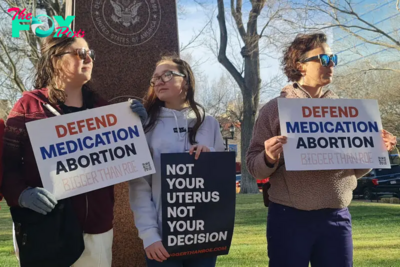Politics
Members of Congress undermine the country – and their own legitimacy – with antidemocratic rhetoric
Blame was cast far and wide after the attempted assassination of former President Donald Trump. Obviously, the shooter was to blame, but depending on your perspective, you also blamed Democrats, Republicans or both for the highly charged partisan rhetoric that has heated up American political life and, for at least some people, made violence seem like an option.
While the event was shocking, the underlying mood has been building for quite a while. The political times Americans are living through are increasingly described as a “crisis of democracy.” Much has been written about growing polarization, reduced public trust in small-d democratic institutions and long-standing principles of behavior often thought of as “democratic norms,” and increasing levels of public support for autocratic ideas and leaders.
Differences over politics and policy have a long history of being divisive, of course. But it’s one thing to disagree over substantive matters such as tax rates or foreign aid and something very different to undermine the legitimacy of your opponents.
It’s the difference between framing those who disagree with you as fair and equal competitors or as enemies who must be defeated. In that context, attempts at cooperation and compromise can be perceived as betrayal, and it becomes easier to rationalize ways that long-standing norms – including but hardly limited to the peaceful transfer of power – and even laws can be ignored or subverted.
As a scholar of American Politics and policy, I’ve studied the causes and effects of trends like these, which make it increasingly difficult even for the most dedicated public officials to govern effectively. It’s no secret that Congress has been growing more dysfunctional and less productive for many years.
But how much are members of Congress themselves contributing to these problems with their own public rhetoric?
As it turns out, quite a lot.

Pushback against democracy
These antidemocratic trends aren’t limited to the U.S., but when they are observed here, the first recourse of many commentators is to attribute them to Trump. Scholars such as Kathleen Hall Jamieson have identified distinctive characteristics in the former president’s public rhetoric that spurn expectations, dodge accountability and violate democratic norms.
Trump has attempted to cast doubt on – and overturn – the results of a national election and more recently has been attempting to undermine confidence in the justice system.
However, no one person is solely responsible for these trends. Shifts like these are shaped by the tone and content of public rhetoric from many sources – prominent among them, other political leaders.
Over the years, many scholars have studied how candidates and officeholders communicate with the public and found patterns of negativity, incivility and irrational language. You could call this “Politics as usual,” but together they are critical components of a larger shift toward antidemocratic rhetoric, the kind of language that leaves policy and ideology behind and risks turning Politics into blood sport.
I worked with a colleague to find a way to identify and measure this kind of language among members of Congress.
All the tweets
We gathered every official tweet – more than a million overall – from members of the 117th Congress from the beginning of 2020 to the middle of 2022. This spanned the 2020 presidential campaign year, the election and its aftermath, on through the beginning of the midterm cycle.
A computer can read text faster than any human, but it takes human awareness to identify phrases such as “count every legal vote” as provocative rather than innocuous. We built a lexicon to identify antidemocratic rhetoric, and our computer-aided analysis of the tweets revealed four key types of words and phrases that do not involve any substantive argument over policy or governance but do include one or more of the following:
Delegitimizing political opponents and the democratic norms and practices that grant them respect. This rhetorical style is most likely to direct explicitly disdainful language at democracy itself. Some notable examples would include “fake news,” “woke mob,” “stop the steal” and “a republic not a democracy.”
Autocratic thinking, embracing strongman-style leadership and other authoritarian traits, with contempt for perceived weakness. Examples include terms such as “weak leader,” “take power” and “so-called voting rights.”
Conspiracy theories, displaying an inability to distinguish truth from mis- and disinformation, with a tendency to see anything and everything as a nefarious threat. Examples include terms such as “deep state,” “groomer,” “cabal” and “socialist agenda.”
Ethno-nationalism, including racism, xenophobia and other forms of bigotry that demonize marginalized groups – promoting an “us vs. them” sensibility and a narrow view of what qualifies as a real American identity. This sort of rhetoric is especially likely to be veiled rather than explicit and includes terms such as “open borders,” “real America” and “take our country back.”
Our analysis found the use of antidemocratic rhetoric increasing steadily over time throughout our study period, with a significant increase following the 2020 election.
And while some observers hoped that the aftermath of Jan. 6, 2021, might provide an opportunity to cool political tempers, that didn’t happen, at least in Congress. Instead, antidemocratic rhetoric increased again after the attack on the U.S. Capitol and continued at high levels thereafter.
A classic example:
U.S. Rep. Mo Brooks, a Republican from Alabama, posted that tweet on Dec. 10, 2021, pulling off a hat trick: delegitimization, ethno-nationalism and conspiracy theory all in a single tweet.
Congress at odds with itself
This kind of language wasn’t being used by every member of Congress, of course. In fact, only 41 members of Congress used identifiable antidemocratic rhetoric very frequently – more than 300 times per member over 2½ years.
But that’s enough to warrant attention.
While members from both parties used antidemocratic rhetoric in their tweets, Republicans used it more frequently, by a ratio of more than 4 to 1. GOP members appeared to be targeting precisely the kind of voters to whom such language appeals strongly.
Male lawmakers also used antidemocratic rhetoric nearly twice as frequently as female members of Congress.
There wasn’t much variation between the Senate and the House, however, even though the House has developed more of a reputation for volatility in recent years.
Twitter has never been the entire political universe, and we’re still working to analyze more traditional forms of political communication, such as press releases and op-eds. Our early findings show trends similar to those found in the tweets.
None of this should be taken to denigrate Congress as a whole. But what’s clear – and unusual – is that many members of Congress have embraced styles of communication that effectively undermine not just their opponents but the very democratic systems that give legitimacy to their own positions of status and power.
This is not normal politics. It is not mere divisiveness, although American politics has indeed been growing more divisive for 30 years and more.
Antidemocratic rhetoric transgresses long-standing norms both of political tolerance and of constitutional limits on power. Without these norms and limits as guardrails, democracy is not likely to be self-sustaining.
Such rhetoric not only makes it more difficult for political officials to serve the public good, but by excluding from the political process those participants deemed unworthy, it negates the very idea of a shared public good that’s worth serving.
-

 Politics1d ago
Politics1d agoThe Last Time the Senate Rejected a President’s Cabinet Nominee of the Same Party
-

 Politics1d ago
Politics1d agoPolice Report Reveals Assault Allegations Against Pete Hegseth
-

 Politics2d ago
Politics2d agoWhy Trump Actually Needs Mexico
-

 Politics2d ago
Politics2d agoMan Convicted of Killing Laken Riley Sentenced to Life in Prison Without Parole
-

 Politics3d ago
Politics3d agoHow the Biden Administration Protected Abortion Pill Access—and What Trump Could Do Next
-

 Politics3d ago
Politics3d agoWhy Trump’s Tariffs Could Raise Grocery Prices
-

 Politics3d ago
Politics3d agoThe First Trans Member of Congress Expected Pushback Like Mace’s Bathroom Rule
-

 Politics3d ago
Politics3d agoNew York Prosecutors Oppose Dismissing Trump’s Hush Money Conviction





















